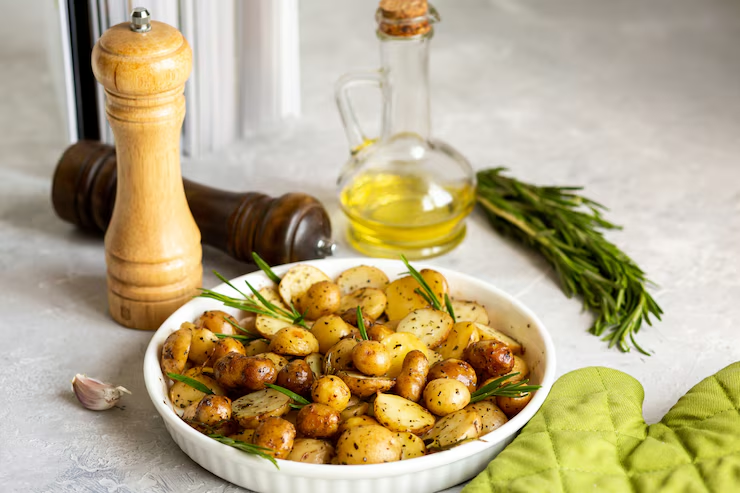Few comfort foods are as popular as baked potatoes. The classic baked potato is tasty and nutritious, whether you eat it as a side or as the main course with a variety of toppings. It fulfills hunger and nourishes the body with its many nutrients.
Baked potatoes are often overlooked for their health benefits, but when prepared correctly, they can be an incredibly nutritious choice. From fiber to vitamins, a baked potato offers a wide variety of nutrients that can contribute to overall health. Let’s take a closer look at its complete nutrition profile.
A Rich Source Of Dietary Fiber
One of the standout nutrition in baked potato is its fiber content. A skin-on medium-cooked potato has 4 grams of fiber. Preventing constipation and promoting regular bowel motions requires fiber. By controlling blood sugar and cholesterol, a high-fiber diet can minimize the risk of chronic diseases like heart disease and type 2 diabetes.
Fiber helps regulate weight by reducing overeating and making you feel full. A baked potato with the skin on delivers a large chunk of your daily fiber needs, making it a nice and easy option to improve fiber intake.
An Excellent Source Of Potassium
Heart and muscle function require potassium. A medium potato has 620 milligrams of potassium, making baked potatoes a good source. This is important because potassium helps regulate fluid balance in the body and supports nerve transmission and muscle contraction. It also stabilizes blood pressure by counteracting salt.
A baked potato can help you obtain enough potassium, especially if you’re trying to increase your intake. In fact, a baked potato offers more potassium than a banana, which is commonly touted as the go-to source of potassium.
Packed With Vitamins: Vitamin C And B6
Baked potatoes are a great source of both Vitamin C and Vitamin B6, two essential vitamins that contribute to overall health. A medium-sized cooked potato provides 20% of your required Vitamin C. This antioxidant vitamin helps the immune system fight disease and infection. It also helps produce collagen, a protein needed for skin, cartilage, and bones.
While potatoes aren’t as commonly associated with Vitamin C as citrus fruits, they are still a valuable source, especially when prepared with the skin on. The vitamin content is most concentrated in the skin, so it’s best to eat the potato with its skin intact for maximum benefit.
However, vitamin B6 is essential for metabolism, brain function, and serotonin generation. A medium baked potato delivers 25% of your daily Vitamin B6 consumption, supporting a healthy neurological system and effective nutritional metabolism.
A Low-Calorie, High-Carb Energy Source
Baked potatoes are rich in carbs, giving the body energy throughout the day. A medium-sized baked potato has 37 grams of carbohydrates, mostly starch. Starch is the body’s preferred source of energy, and it is slowly converted into glucose, providing a steady release of energy over time.
Despite their high carbohydrate content, baked potatoes are relatively low in calories. A 160-calorie medium potato is filling and can be part of a balanced meal. For those watching their weight or trying to manage their calorie intake, the baked potato offers a great way to satisfy hunger without overindulging in empty calories.
A Source Of Plant-Based Protein
Though not as high in protein as animal products, a baked potato does offer a modest amount of plant-based protein. Four grams of protein in a medium-sized baked potato can meet your daily protein needs. This may not replace meat, but it can give a complete amino acid profile to a plant-based diet that includes other protein sources.
Antioxidants And Phytochemicals
Potatoes, especially those with vibrant-colored skins like purple or red potatoes, are rich in antioxidants. These chemicals lessen the risk of heart disease and cancer by preventing oxidative stress. The antioxidants in potatoes include carotenoids and flavonoids, which are powerful phytochemicals that contribute to overall health.
Purple potatoes, in particular, are known for their high anthocyanin content, a type of antioxidant that gives them their deep color. Anthocyanins have been shown to have anti-inflammatory effects and may help improve cardiovascular health.
Conclusion
Baked potatoes are sometimes criticized for being rich in carbohydrates, although they have a great nutritional profile. From being a rich source of fiber, potassium, and essential vitamins, to providing antioxidants and plant-based protein, a baked potato is much more than a comfort food. It’s a nutritious option that can be part of a balanced diet, offering a variety of health benefits that support everything from digestive health to heart function and immune support.

